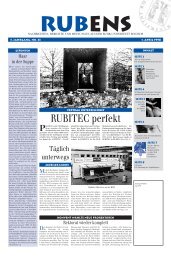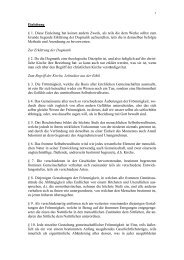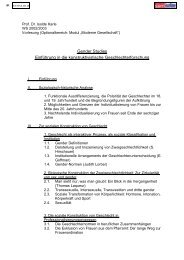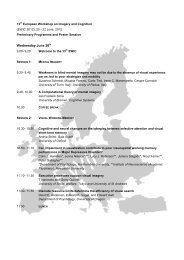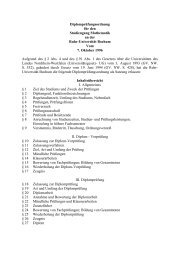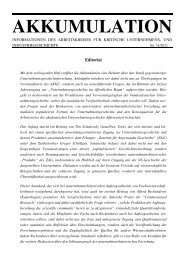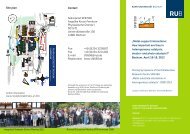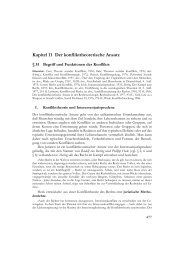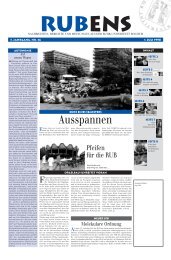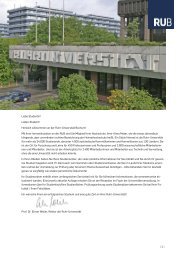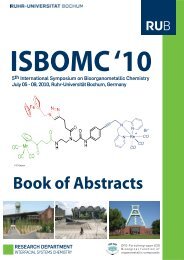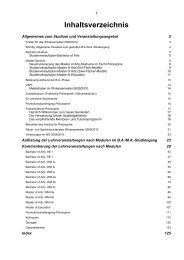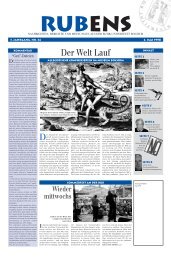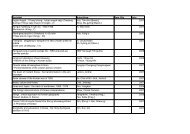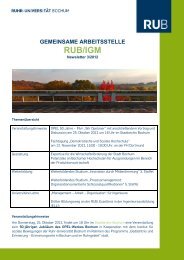RUBensinternational - Ruhr-Universität Bochum
RUBensinternational - Ruhr-Universität Bochum
RUBensinternational - Ruhr-Universität Bochum
Create successful ePaper yourself
Turn your PDF publications into a flip-book with our unique Google optimized e-Paper software.
Photo: Jan Pollmann<br />
<strong>RUBensinternational</strong><br />
SuPPlement: cAmPuS WItHout borderS<br />
AnnuAl AcAdemIc celebrAtIon<br />
Once a year, <strong>Ruhr</strong> University <strong>Bochum</strong><br />
throws itself a party. The Annual<br />
Academic Celebration revisits<br />
the past year in words and pictures,<br />
and acknowledges great accomplishments<br />
among members of the RUB<br />
community. This year’s festivities will<br />
take place in the Audimax on November<br />
18th, starting at 11:00 a.m., during<br />
which Tongji University will receive a<br />
very special honor.<br />
Over 30 years ago, RUB had the<br />
great honor of becoming Tongji University’s<br />
first foreign partner university. In<br />
1990, to celebrate RUB’s 25th anniversary<br />
and the 10th year of its partnership<br />
with the Shanghai university,<br />
Tongji University presented the RUB<br />
with the campus’s Chinese Gardens –<br />
the only southern Chinese-style garden<br />
in Germany. Now it is time for RUB<br />
to duly recognize its important Chinese<br />
partner. To underscore the formality of<br />
the occasion, a special session of the<br />
RUB Senate will be called during the<br />
celebration, during which RUB’s Rector,<br />
Professor Elmar Weiler, will present<br />
his Chinese counterpart, Professor<br />
Gang Pei, with the award “Pro Societate<br />
multorum annorum” (for longstanding<br />
partnership).<br />
The entire Annual Academic Celebration<br />
will have a strong International<br />
flavor this year. “People from over<br />
120 different countries come together<br />
at the <strong>Ruhr</strong> University <strong>Bochum</strong>. We<br />
want our guests to be immersed in<br />
this very special atmosphere,” Rector<br />
Weiler promises. As a complementary<br />
addition to the program, the cultural<br />
office of the Akademische Förderungswerk<br />
(Academic Support Group<br />
which is celebrating its 25th anniversary<br />
this year) will have performances<br />
and demonstrations celebrating cultures<br />
from all over the world.<br />
A number of other awards will be<br />
given out during the celebration, such<br />
as the <strong>Ruhr</strong> University <strong>Bochum</strong> badge<br />
of honor, as well as the Lore Agnes<br />
Prize recognizing special projects to<br />
advance gender equality; the recipients<br />
of both will remain undisclosed<br />
until the celebration. As is customary,<br />
the RUB Rectorate will also announce<br />
special awards given to outstanding<br />
graduates from all disciplines of the<br />
university.<br />
All students and members of the<br />
RUB community, including family<br />
members, friends, and supporters of<br />
RUB, are invited to attend this year’s<br />
12th Annual Academic Celebration.<br />
International members of the university<br />
are especially encouraged to join<br />
in the festivities. ad<br />
Information: www.rub.de/jahresfeier<br />
TEA CEREmONy<br />
A Japanese tea ceremony normally takes place in a very simply decorated tea house. But inner peace and space for contemplation<br />
can also be found in front of the Tutoring Center. Psychology student Anika Eberz, of German-Japanese heritage, is dressed<br />
traditionally in a kimono. She prepares tea for herself and Romina Malandrino, a student of East Asian Studies who spent a year<br />
in Tokyo, where she learned how people in Japan dress today. The two students not only symbolize traditional and contemporary<br />
Japan – they are also drawing attention to the Japan Week, which will take place at RUB at the end of November (see page 3). ad<br />
INTERNATIONAL PILOTS<br />
Staff members assist international visitors<br />
RUB WAS NUmBER 1 The administration is a section of the<br />
Marble pillar (Huabiao) at<br />
Tongji University<br />
Photo: Nilei.Net/wikipedia.org<br />
university whose relevance, unlike that<br />
of research and teaching, only becomes<br />
apparent at second glance. In the ongoing<br />
pursuit towards more internationality<br />
across all RUB departments, the administration<br />
fulfills a vital part: it is here that<br />
cross-sectional tasks are performed and<br />
parameters for international activities are<br />
drawn up. The internationalization strategy<br />
paper, issued by the Rector’s Office in<br />
August 2010, dedicates an entire chapter<br />
to the administration.<br />
The university’s administration is an<br />
important and, more often than not, first<br />
port of call for international RUB members.<br />
The administration’s bodies – first<br />
and foremost the International Office – offer<br />
assistance and support to international<br />
students and scholars, and they promote<br />
the RUB members’ mobility. Cross-cultural<br />
openness and competence are vital<br />
qualities for the administration if the aim<br />
is to promote the RUB’s internationalization<br />
process: the responsibility for this<br />
process lies not only with the International<br />
Office, but rather with each and every<br />
body within the administration.<br />
A first step towards this goal has now<br />
been taken: the administrative departments<br />
and offices have appointed “international<br />
pilots” who are going to be the<br />
first points-of-contact for international<br />
university members and visitors. These<br />
pilots are members of staff with an interest<br />
in international issues who display<br />
outstanding administrative capabilities<br />
as well as intercultural competencies and<br />
have a good grasp of English. In future,<br />
they are going to help international visi-<br />
Photo: Nelle<br />
Friederike Bergstedt helps US-student Terrence Jimerson navigate the website of the German<br />
philology<br />
tors navigate through their areas of competence,<br />
assisting them in finding the<br />
right point-of-contact, and, if necessary,<br />
offer advice, answer questions and, should<br />
the occasion arise, translate for them, until<br />
the matter at hand is resolved. They fulfill<br />
the role of first points-of-contact within<br />
their department or function, both for the<br />
departmental staff as well as for international<br />
visitors. By infusing troubleshooting<br />
ideas, the pilots facilitate knowledge<br />
gain of their administrative department<br />
or office and, ultimately, help to improve<br />
overall service. As a result, business processes<br />
can be optimized and workflows<br />
overhauled.<br />
Pilot Workshop<br />
lISt oF InternAtIonAl PIlotS<br />
This entire concept is founded upon<br />
the crucial element of networking, both<br />
among the pilots themselves and between<br />
the pilots and the International Office.<br />
To this end, the first Pilot Workshop took<br />
place at the end of September. By way of<br />
example, four fictitious cases were presented,<br />
all of which posed complex international<br />
challenges that had to be resolved.<br />
Working as a team, the pilots tried<br />
to find answers and solutions. The examples<br />
included the case of Chinese engineer<br />
Xuxing Wu who, in addition to his duties<br />
as research assistant, wishes to provide<br />
Tai Chi classes as part of the university’s<br />
extracurricular sport activities. Another<br />
case has medical student Marina Reimann<br />
struggle with the question of how to represent<br />
the RUB at an international trade fair<br />
during her one-year internship abroad. All<br />
fictitious clients were presented with the<br />
answers they needed – after all, the contacts<br />
from all administrative bodies were<br />
gathered around the same table. “This is<br />
what cooperation should always look like”<br />
– such was everyone’s conclusion after the<br />
first meeting. Ulrike Herrlich<br />
claudia Haun, Dezernat 1 | dr. Heike Hunneshagen, Dezernat 2 | ute Gode, Dezernat 3 | Amanda Wartenweiler, Dezernat 4<br />
Ina Schwarz, Dezernat 5 | mihran müller-bickert, Dezernat 5 | dr. christiane lohaus, Dezernat 6 | carsten Sander,<br />
Dezernat 6 | Wibke Krahl, Dezernat 7 | christoph Jochindke, Justitiariat | beate Schiller, Stabsstelle Strategische PR und<br />
markenbildung | uwe Koßmann, Stabsstelle Organisation – Entwicklung – Beratung | ralf otto, Stabsstelle eLearning | Friederike<br />
bergstedt, Stabsstelle Interne Fortbildung und Beratung (Dezernat = administrative department; Stabsstelle = office)
Photo: private<br />
2 rubenS InternAtIonAl<br />
The 16 students from Philadelphia at the Kokerei Hansa in Dortmund<br />
“SO mANy TINy CARS!”<br />
First Summer School with drexel university<br />
From July to mid-September, the first “<strong>Bochum</strong> Engineering Summer” took place at<br />
RUB. Sixteen engineering students from Philadelphia’s Drexel University took part,<br />
bringing along their professor, Dr. Steve Wrenn, and graduate student Steven Dicker.<br />
The academic instruction and support for the program came from Dr. Stefan Pollak<br />
from the Chair for Solid Matter Process Technology (held by Professor Marcus Petermann)<br />
and Professor Georg Schmitz, who holds the Chair for Medical Engineering.<br />
In addition to German language lessons, participants took courses in statistics, fluid<br />
dynamics, and unit operations. The students were also responsible for completing a<br />
small independent research paper.<br />
The International Office organized a cultural program and arranged accommodation<br />
in RUB dormitories. As part of a “Welcome Day” program, students received practical<br />
orientation materials and took a tour of the campus. During the tour, it quickly<br />
became clear that in the USA everything is a little bit bigger. At the I-Süd street parking<br />
lot there were a lot of surprised and confused looks, as the American exchange<br />
students exclaimed, “So many tiny cars!” At least some 20-year-olds in the USA drive<br />
big Jeeps that get only 12 miles per gallon!<br />
One of the highlights of the cultural program was attending the “Extraschicht” event<br />
on July 9th. American students were exposed to the cultural diversity and industrial<br />
heritage of the <strong>Ruhr</strong> area, and they were duly impressed by the industrial memorial<br />
Kokerei Hansa (an historic coking plant) in Dortmund, the Dortmund “U” (a re-purposed<br />
brewery, now an arts center), and <strong>Bochum</strong>’s own Westpark (a completely transformed<br />
industrial area, now home to a park and opera house).<br />
Throughout the summer, program participants took part in a number of other excursions<br />
and visits to local sites such as a trip to the Zeche Zollverein (a re-purposed<br />
coal mine which is now a center for creative businesses and the arts), the Fiege Brewery,<br />
Bonn, the Opel auto factory, the WDR radio station, and TV studios in Essen. In<br />
addition, students planned their own weekend trips across Europe.<br />
Eight students from RUB will attend Drexel next year. They already got to know<br />
several of their future Drexel classmates in <strong>Bochum</strong> and have connected on Facebook.<br />
This will help them prepare for their trip and get quick answers to their practical questions.<br />
The first <strong>Bochum</strong> Summer School with Drexel University was an overwhelming<br />
success for both sides, and is scheduled to run again next year. Magdalena Bichmann<br />
NEW PARTNER IN EAST ASIA<br />
RUB has found a new East Asian partner in Seoul’s Sogang University. A high-ranking<br />
delegation from Seoul visited <strong>Bochum</strong> on October 13th, during which time the four<br />
Korean visitors along with Professor Jong Wook Lee (President of Sogang University,<br />
third from left) met with Professor Nils Metzler-Nolte (Vice Rector for Young Scientists<br />
and International Matters, fourth from the left) and representatives from the Faculty<br />
for East Asian Studies. Many international cooperation agreements have already<br />
been established by RUB’s Fakultät of East Asian Studies, especially within the literature<br />
and language sections. After discussing the many opportunities for universitywide<br />
cooperation, both parties signed the partnership agreement. ad<br />
Photo: Dessaul<br />
About uS<br />
Editor: Press office of the <strong>Ruhr</strong>-<strong>Universität</strong>, Manager: Dr. Josef König (responsible in terms of press legislation); Editorial<br />
office: Arne Dessaul, ad, (CvD, picture editorials); Address of editorial office: Editorial Office of the RUB, (UV 366)<br />
44780 <strong>Bochum</strong>, Phone 0234/32-23999, -22830; Fax 0234/32-14136, Internet: www.rub.de/rubens, Email: rubens@<br />
presse.rub.de; Layout and set: Stefan Weituschat, Printing office of the RUB; Advert administration and production:<br />
vmm Wirtschaftsverlag GmbH & Co. KG, Maximilianstr. 9, 86150 Augsburg, Phone 0821/4405-423. RUBENS International<br />
generally appears twice a year as a supplement to RUBENS, Newspaper of the <strong>Ruhr</strong> <strong>Universität</strong> <strong>Bochum</strong>.<br />
Contributions mentioning the author do not necessarily represent the opinion of the editorial office. Edition: 13.200.<br />
Photo: Dessaul<br />
november 2011<br />
Before interning or studying abroad, you should consult the International Office or other experts, like these students at the “Without Borders”<br />
(“Grenzenlos”) international opportunities fair in the Audimax.<br />
ComBInIng Work And Fun<br />
that is what an Internship Abroad Stands For<br />
Many employers prefer to hire university graduates who have lived abroad for a certain time. Therefore, many students decide to<br />
spend a semester or year in a foreign country. Combined study and internship trips have become more and more popular over<br />
the past years. An internship abroad is a great way to gain valuable work experience while getting to know a new country and language.<br />
In addition, you can become familiar with the work life and organizational structures in other cultures and learn how to<br />
work in an international team. The International Office of <strong>Ruhr</strong>-<strong>Universität</strong> <strong>Bochum</strong> provides useful information concerning the<br />
search and placement of internships and concerning scholarships.<br />
If you are lucky, you might end up with a paid internship. If this does not work out, there are other ways to finance your stay<br />
abroad. For example, as of 2007 on, you can receive up to € 300 per month from the EU’s ERASMUS Student Mobility Program<br />
for an independently organized internship in an EU member state and in Iceland, Croatia, Switzerland, Liechtenstein, Norway<br />
and Turkey. If you intern overseas in a field relevant to your area of studies, you can apply for financial support via the DAAD’s<br />
PROMOS program. You will then receive a monthly scholarship of € 300 – plus travel expenses. Yet, what is it really like to intern<br />
abroad? RUBENS interviewed two RUB students who recently returned from England and the USA.<br />
TeAChIng In SheFFIeld<br />
Muriel August (23) attended the University<br />
of Sheffield from January to June 2011<br />
on an ERASMUS Mobility Grant. The<br />
Master’s of Education student (studying<br />
German and English) interned as an assistant<br />
teacher in the Modern Languages<br />
Teaching Centre (MLTC), where she<br />
helped with German language instruction.<br />
RUBENS: How did you discover the<br />
University of Sheffield?<br />
M. A.: By coincidence. A friend of mine<br />
told me that a lecturer in our English Department,<br />
John Poziemski, had posted<br />
some information about an internship<br />
on his homepage. I’d always wanted to<br />
go to England – and because I was in between<br />
my B.A. and M.A. studies, the timing<br />
was perfect.<br />
How did you find the information you<br />
needed?<br />
Through John Poziemski and the internet.<br />
Deciding to go was easy – it sounded<br />
so interesting. Since <strong>Bochum</strong> and Sheffield<br />
are sister cities, the University of<br />
Sheffield gives preference to internship<br />
applicants from <strong>Bochum</strong>.<br />
Just one day after I applied,<br />
I received word from Sheffield<br />
that I was accepted.<br />
Was it just as easy to get<br />
a scholarship?<br />
Yes, although it took<br />
longer. I had about nine<br />
months between submitting<br />
my application and starting<br />
the internship, which gave<br />
me ample time to apply for<br />
an ERASMUS scholarship. I also received<br />
a special financial aid package for studying<br />
abroad from Bafög, the German federal<br />
government’s student-aid program.<br />
That was easy, too, as I was already getting<br />
financial aid from them.<br />
How was the internship?<br />
Overall it was great, though I would<br />
have loved to have taught lessons myself –<br />
but that wasn’t possible because with just<br />
a bachelor’s degree, I wasn’t yet qualified.<br />
However, I took care of preparation and<br />
follow-up for the courses, conducted re-<br />
Photo: privat Photo: Nelle<br />
Photo: Nelle<br />
search, and corrected tests. During the lessons,<br />
I was asked to correct students’ pronunciation.<br />
The MLTC is a cross between<br />
a university and a continuing education<br />
facility, which means that course participants<br />
come from all walks of life, including<br />
university students as well as non-students,<br />
young and old. That was exciting.<br />
And I really enjoyed the city of Sheffield.<br />
What advice would you give to your fellow<br />
RUB students who would like to get<br />
practical experience abroad?<br />
Just do it!<br />
ThE NEWSPAPER BUSINESS IN LONG BEACh<br />
Ronja Laarmann-Quante (20) is studying<br />
Linguistics and English at RUB. With the<br />
support of a PROMOS scholarship, she<br />
completed an internship at the newspaper<br />
The Beachcomber in Long Beach,<br />
California (USA), in August and September<br />
of this year.<br />
RUBENS: How did you end up at The<br />
Beachcomber?<br />
R. L-Q.: I already had friends in Long<br />
Beach, so deciding where to go was easy.<br />
I really wanted to intern for a newspaper.<br />
For one thing, I’d already gotten a taste<br />
of working at a paper during a short internship<br />
in France, which was a lot of fun.<br />
Moreover, I wanted to learn more about<br />
the people and culture in California. I<br />
figured that a newspaper was the perfect<br />
place to do both. So, I just looked in the<br />
Yellow Pages and found The Beachcomber’s<br />
website.<br />
Is that how you learned more about<br />
The Beachcomber?<br />
Yes, that’s right. You could read entire<br />
issues online, and the overall style of<br />
the paper appealed to me. I noticed that<br />
they regularly published articles written<br />
by interns. In other words, I was certain<br />
I would be allowed to do much more<br />
than just make coffee.<br />
How hard was it to get a scholarship?<br />
I could tell from the description of<br />
the PROMOS scholarship that it was a<br />
perfect fit for what I wanted to do. Getting<br />
the paperwork together was a bit<br />
of a hassle, but that made getting the<br />
award letter all the sweeter. It helped<br />
enormously that I could turn to the International<br />
Office for assistance at any<br />
time during the process.<br />
Did everything go smoothly after<br />
you arrived?<br />
Absolutely. Before I went there, I was<br />
assured that I would be exposed to all aspects<br />
of the newspaper business, and that<br />
I’d be writing my own articles. All of that<br />
actually happened.<br />
What advice do you have for your fellow<br />
RUB students?<br />
In my experience, you should seek a<br />
challenge in your internship. You should<br />
not hesitate to write to a company asking<br />
for information about internships, even<br />
if they haven’t specifically advertised anything.<br />
I also discovered that if you don’t<br />
get an answer at first, it’s well worth fol-<br />
lowing up after a little while. My original<br />
e-mail to The Beachcomber either never<br />
made it there or was simply lost in the<br />
piles of e-mails they receive every day. It<br />
also helps if you mention right away that<br />
your (health) insurance is taken care of, as<br />
a lot of companies in other countries assume<br />
that taking on an intern from abroad<br />
is too much extra work.<br />
For an overview of information relating to<br />
internships abroad:<br />
http://www.international.rub.de/ausland/<br />
praktikum/index.html.de
Photo: Jan Pollmann<br />
november 2011<br />
In her free time, student Anika Eberz volunteers at the Japanese-German Culture Workshop<br />
(www.tenri-kw.de/uber). Here, she is sitting in the cafeteria enjoying onigiri, a flavorful<br />
Japanese rice ball. The cafeteria will be serving Japanese delicacies during Japan Week.<br />
ExPERIENCE JAPAN<br />
"Japan Week": culture, cuisine, conferences<br />
This year marks the 150th anniversary<br />
of the first Japanese-German treaty on<br />
friendship, cooperation, and trade, and<br />
the official commencement of German<br />
and Japanese relations. Since then, there<br />
has been active exchange and close cooperation<br />
in the areas of culture, business,<br />
and science. Highlighting the spirit of the<br />
German-Japanese friendship, this special<br />
anniversary will be celebrated in both<br />
countries, including at RUB. Japan Week,<br />
which receives funding and support from<br />
the German Rectors’ Conference, will be<br />
celebrated here November 21st-25th. RUB<br />
will show off its Japanese side through academic<br />
events and a “Japan Info Day”, and<br />
campus life will revolve around all things<br />
Japanese. The International Office and the<br />
Dermatology Clinic at RUB are coordinating<br />
the week’s activities.<br />
Have you ever wondered what Ikebana<br />
is? What a Haijin does, or how people<br />
greet each other in Japan? To find out, you<br />
can join one of the many workshops taking<br />
place during Japan Week. The German<br />
Haiku Society, Origami Deutschland e.V.,<br />
and the Ikebana teacher Florian Patzke<br />
invite you learn a traditional Japanese art<br />
form. The RUB’s Language Institute will<br />
put on a two-day workshop to prepare you<br />
for a research stay in Japan and an evening<br />
of karaoke will give you a taste of modern<br />
Japanese culture. The student film club<br />
will show a Japanese film, and the cafeteria<br />
will serve sushi prepared by the <strong>Bochum</strong><br />
Academic Support Group, as well<br />
as other Japanese specialties.<br />
Partners for over 40 years<br />
RUB has been working closely with<br />
numerous Japanese universities for more<br />
than four decades. The first cooperation<br />
agreement was signed with the University<br />
of Tokyo in 1969; the most recent<br />
cooperation agreement was formalized<br />
in 2010 with Osaka University. RUB is<br />
the only university in Germany to have<br />
a Fakultät (i.e., academic department or<br />
faculty) of East Asian Studies. Scholars<br />
from its four sections (“Japanese History”,<br />
“Japanese Language and Literature”,<br />
“Economics of East Asia”, and “Politics of<br />
East Asia”) undertake research on a variety<br />
of different topics relating to Japan. Japan<br />
Week’s main focus is to publicly highlight<br />
the impressive breadth of scholarly work<br />
conducted by RUB and its Japanese partner<br />
universities.<br />
There will also be two symposia showcasing<br />
German-Japanese research projects.<br />
At the 6th annual German-Japanese<br />
HIV Symposium on November 21st and<br />
22nd, 14 Japanese and German researchers<br />
will present their latest results. This<br />
international collaboration in AIDS research,<br />
spearheaded by Prof. Norbert<br />
Brockmeyer (RUB) and Prof. Takashi Oka-<br />
moto (Nagoya City University), has become<br />
firmly established over the past six<br />
years. Early career researchers, in particular,<br />
will have an excellent opportunity to<br />
network with leading German and Japanese<br />
HIV researchers at the symposium.<br />
Admission is free for everyone.<br />
Researchers from all Fakultäten who<br />
cooperate with Japanese partners or are<br />
interested in cooperating with them are<br />
invited to the “Interdisciplinary Symposium”<br />
on November 22nd. Many members<br />
of the RUB community maintain<br />
close partnerships with Japanese colleagues<br />
and some will report on their<br />
experiences at the event: presenters will<br />
include Dr. Erik Bründermann (nanotechnology),<br />
Prof. Regine Mathias (East<br />
Asian studies), Dr. Marc Nowaczyk (biochemistry),<br />
Prof. Karl Riesenhuber (law),<br />
and Prof. Uwe Czarnetzki (experimental<br />
physics), who will appear along with Prof.<br />
Toshiaki Makabe (Vice President of Keio<br />
University).<br />
Japan Info day<br />
At the “Japan Info Day”, which will take<br />
place in the foyer of the Audimax on November<br />
23rd, interested students and researchers<br />
can learn more about exchange<br />
opportunities in Japan. In addition to the<br />
International Office, which will provide<br />
information about the partnerships that<br />
exist between RUB and Japanese universities,<br />
various other external institutions<br />
– for example, the GIZ (Gesellschaft für<br />
Internationale Zusammenarbeit), the Japan<br />
Foundation, the DAAD, and the Robert<br />
Bosch Foundation will also introduce<br />
their Japan-related programs. This will be<br />
a great chance to network and learn about<br />
scholarships and stipends, internship opportunities,<br />
and exchange programs.<br />
Japan Week will further strengthen<br />
academic exchange between RUB and its<br />
Japanese partners and will also emphasize<br />
the mutual support they provide to each<br />
other. Months later, the consequences of<br />
the earthquake that occurred on March<br />
11th, 2011, continue to place a huge burden<br />
on Japan. The East Asian Studies student<br />
organization will hold a bake sale<br />
on the “Japan Info Day” with the proceeds<br />
going to the Japanese projects of the<br />
Deutschen Direkthilfe Organisation e.V, a<br />
German non-profit organization.<br />
Japan – a country where the traditional<br />
and the modern exist side by side, where<br />
art and culture as well as science and research<br />
are unified at a world-class level,<br />
where the high-tech and the classical coexist.<br />
A country of contrasts. A country<br />
worth getting to know better during Japan<br />
Week. Ulrike Herrlich, Judith Coenenberg,<br />
Romina Malandrino<br />
More information at: http://www.international.rub.de/japan/<br />
Photo: private<br />
The BeST For our gueSTS<br />
eSn bochum takes care of its exchange students<br />
Almost every student these days is or has<br />
been a foreign exchange student somewhere,<br />
at some time. And, of course, an<br />
exchange student in <strong>Bochum</strong> from Kiev,<br />
Ukraine, doesn’t only want to study hard,<br />
but also wants to enjoy his time at their<br />
host university. The same holds true for<br />
the student from <strong>Bochum</strong> who’s spending<br />
a semester abroad in, for example, Liège,<br />
Belgium. The Erasmus Student Network<br />
(ESN) helps make every student’s stay<br />
abroad easier and more enjoyable. With<br />
branches called “Sections” at 374 higher<br />
education institutions across Europe, the<br />
ESN offers programs and services tailormade<br />
to meet student needs, from arranging<br />
pick-ups from the train station<br />
to organizing group outings and soccer<br />
games. The first ESN Section in Germany<br />
was founded in <strong>Bochum</strong> in 1990. Today,<br />
about 25 students from <strong>Ruhr</strong> University<br />
<strong>Bochum</strong> (RUB) volunteer their time<br />
to take care of roughly 300 exchange students<br />
in <strong>Bochum</strong>.<br />
“Our active students come from all<br />
fields of study,” explains Joana Dewender,<br />
the current president of the ESN <strong>Bochum</strong><br />
Section, “And foreign exchange students<br />
come from all over the world – America,<br />
Africa, Asia, and, of course, Europe. Only<br />
Australia isn’t yet represented, as far<br />
as I know.” In addition to the 300 visiting<br />
students taking part in exchange programs<br />
(ERASMUS, DAAD), the ESN also<br />
provides services for international doctoral<br />
candidates.<br />
The ESN’s pick-up service is particularly<br />
helpful for new arrivals: exchange students<br />
can request to be picked up directly<br />
upon arrival at <strong>Bochum</strong>’s main train station<br />
and brought to the dorm they’ll be living<br />
in for up to 12 months. During their<br />
time in <strong>Bochum</strong>, exchange students can<br />
take advantage of the ESN’s many offerings:<br />
going on excursions and tours of<br />
<strong>Bochum</strong>, watching soccer games, attending<br />
plays or musicals, going to parties, or<br />
just getting together at a local bar in the<br />
Bermudadreieck. But most of all, they can<br />
get to know other exchange students and<br />
German students, which helps them feel<br />
more at ease in their host country.<br />
Getting involved<br />
Students from <strong>Bochum</strong> who study<br />
abroad for one or two semesters at an<br />
institution that has an ESN Section get<br />
the same kinds of services as exchange<br />
students in <strong>Bochum</strong>. That’s how Joana<br />
Dewender first became aware of the organization.<br />
As an exchange student in<br />
What are some of the special events<br />
planned for exchange students in the<br />
winter semester?<br />
A regularly updated list of events and<br />
ongoing services is posted on our website<br />
at http://bochum.esngermany.org/<br />
and also on our Facebook page (search<br />
for “ESN <strong>Bochum</strong> vonne RUB”). We often<br />
have impromptu events, so it pays<br />
to check in regularly. That said, one upcoming<br />
event which I can highly recommend<br />
is the “Deutscher Abend” (German<br />
Evening) in the Euroeck on November<br />
13th. We want to introduce exchange<br />
students to German culture while sharing<br />
a hearty dinner. There is also the<br />
“ESN-Einbürgerunsgtest” (ESN Citizenship<br />
Test) during which we’ll quiz participants<br />
about their knowledge of Germany.<br />
you can even win some great prizes. December<br />
2nd to the 4th, the “ESNters” will<br />
take place in Berlin – this is the event of<br />
the semester (see http://esnters.esngermany.org/<br />
for more). Several German<br />
ESN sections will meet with the aim of<br />
strengthening the network for exchange<br />
students across Germany. The ESN sections<br />
from <strong>Bochum</strong>, Dortmund, and Düsseldorf<br />
(together with their respective exchange<br />
students) will travel together to<br />
3 rubenS InternAtIonAl<br />
Pick-up service: Participants in the three-week orientation program are welcomed right as they arrive at <strong>Bochum</strong>’s main train station.<br />
excHAnGe, exPerIence, excItement<br />
three questions for eSn bochum<br />
Section President Joana dewender<br />
rubenS: How do you bring exchange<br />
students and German students<br />
together?<br />
Joanna dewender: Unfortunately,<br />
it’s generally very difficult for exchange<br />
students to get to know the “natives”,<br />
German students in our case, because<br />
they tend to shy away from investing<br />
much energy in seemingly short-lived<br />
relationships with exchange students.<br />
After all, exchange students are only<br />
in <strong>Bochum</strong> for six months or a year,<br />
maximum. But it’s a misconception to<br />
think that these friendships only last<br />
that long; in fact, most people stay in<br />
long afterward and develop life-long<br />
friendships – sometimes even taking<br />
advantage of the chance to have a<br />
cheap vacation and visit their friends’<br />
home countries. This lets everyone<br />
have an exchange experience! I can really<br />
only encourage German students to<br />
get more involved with supporting exchange<br />
students and take part in ESN<br />
events. These events are one of the few<br />
ways exchange students can meet German<br />
students. Everyone is more than<br />
welcome!<br />
Liège, Belgium, she was happy to have<br />
the support of ESN’s services and offerings<br />
while there. “The ESN was very visible<br />
in Liège; that impressed me,” she<br />
remembers. As soon as she returned to<br />
<strong>Bochum</strong>, she joined the ESN Section here.<br />
This is the most common way students<br />
find out about the ESN and become members.<br />
“And we are always looking for new<br />
members,” adds the ESN <strong>Bochum</strong> President,<br />
who is studying politics and Oriental<br />
studies.<br />
Because Dewender works as a student<br />
assistant in the International Office, she<br />
automatically collaborates closely with<br />
this part of RUB’s central administration,<br />
which is responsible for supporting all international<br />
guests at RUB. “We coordinate<br />
what we offer, in terms of content as well<br />
as timing,” the student explains.<br />
Additional ESN partners include other<br />
student organizations at RUB, such as<br />
the student film group Studienkreis Film<br />
(SKF) or the campus radio station CT das<br />
radio. In May 2011, ESN and CT organized<br />
a joint workshop for exchange students<br />
and produced a radio show on “Exchange<br />
at RUB”. The show was broadcast on the<br />
campus radio station at the end of June. ad<br />
Info: https://www.facebook.com/esnbochum.vonnerub.<br />
Berlin. And finally, on december 10th,<br />
there will be a Christmas party in the<br />
Kulturcafé, where we will celebrate and<br />
get into the holiday spirit together with<br />
the International office and the Boskop<br />
Study Buddy program.<br />
In one sentence: What can you<br />
promise exchange students who take<br />
part in your programs?<br />
We can offer you what often gets neglected<br />
compared to your studies: a social<br />
life in Germany with other exchange<br />
students as well as Germans, lots of experience<br />
and excitement – there’s a little<br />
something for everyone!<br />
Photo: private
4 rubenS InternAtIonAl<br />
1,000 BrAzIlIAnS For The uAmr<br />
The first months in the liaison office Con<strong>Ruhr</strong> Latin America<br />
The University Alliance Metropolis <strong>Ruhr</strong><br />
(UAMR) has been represented with its<br />
Con<strong>Ruhr</strong> liaison offices in New York<br />
(since 2005) and Moscow (2009) for quite<br />
some time. In spring 2011, a new office<br />
opened its doors. Situated in the Brazilian<br />
metropolis Rio de Janeiro, Con<strong>Ruhr</strong><br />
Latin America will coordinate the activities<br />
of the UAMR universities <strong>Bochum</strong>,<br />
Dortmund and Duisburg-Essen in the<br />
Latin American region. Its objective is to<br />
promote the <strong>Ruhr</strong> area in Latin America<br />
as an excellent academic and research hub<br />
and to support and organize research partnerships<br />
as well as joint academic projects.<br />
It aims at, for example, furthering<br />
student exchange programs, attracting excellent<br />
PhD students, and promoting research<br />
exchanges of scientists that entail,<br />
among other, joint degree and university<br />
partnership programs.<br />
The launch of the liaison office was<br />
well timed: in spring 2011, Brazilian President<br />
Dilma Rousseff had announced that<br />
ten percent of the recently added 100,000<br />
international scholarships granted to Brazilian<br />
students will be assigned for exchange<br />
programs to Germany.<br />
The office is headed by Prof. Dr. Christoph<br />
de Oliveira Käppler (TU Dortmund).<br />
He is assisted in his duties by Dr. Stephan<br />
Hollensteiner, who, based in Rio, is responsible<br />
for running the office on a fulltime<br />
basis. Just like Prof. Käppler, Dr.<br />
Hollensteiner has established excellent<br />
relationships with universities across Latin<br />
America and had previously worked for<br />
the DAAD in Rio as well as the International<br />
Office of the TU Munich. The liaison<br />
office is located in the German Consulate<br />
building, in the section occupied by<br />
the German Academic Exchange Service<br />
(DAAD, Deutscher Akademischer Austauschdienst).<br />
After returning from their recent trip<br />
to Brazil, Prof. Käppler and Dr. Hollensteiner<br />
visited the RUB and discussed<br />
Con<strong>Ruhr</strong> Latin America with Arne Dessaul.<br />
It soon became apparent how enthusiastic<br />
they both are about their work and<br />
about Brazil.<br />
A highly-frequented Office<br />
RUBENS: How long have you been<br />
in Brazil and which places did you visit?<br />
Prof. Käppler: Our visit lasted three<br />
weeks. One reason it was brought about<br />
was the German-Brazilian Economic<br />
Meeting in Rio. It was attended by a host<br />
of VIPs: German and Brazilian politicians,<br />
as well as high-ranking officials from science<br />
and research organizations, such as<br />
DAAD and DFG, and their Brazilian counterparts,<br />
CAPES and CNPq.<br />
Dr. Hollensteiner: Subsequently, we<br />
visited the international offices of several<br />
large, high-brow public universities: Rio,<br />
Belo Horizonte and Brasilia. We wish to<br />
gather information about their existing cooperation<br />
programs, both for the teaching<br />
staff as well as for faculty members, just<br />
like we do in the <strong>Ruhr</strong> area. Moreover, we<br />
wish to assess future possibilities of university<br />
partnerships. In Brasilia, we also<br />
visited the DAAD counterpart CAPES.<br />
Käppler: And we opened the office.<br />
What is the office like? Do many people<br />
come in?<br />
Hollensteiner: It is a pleasant, spacious<br />
room, furnished with a PC, printer, phone<br />
and a meeting table. The walls are covered<br />
in posters of the UAMR universities. From<br />
November on, when I’m there on a permanent<br />
basis, I will have fixed office hours.<br />
Käppler: If you want to visit the office,<br />
you mustn’t forget your ID. Since we are<br />
located in the German Consulate building,<br />
there are access controls.<br />
competitive edge<br />
The Brazilian government grants<br />
100,000 scholarships for internation-<br />
Rio – <strong>Ruhr</strong> – Rio: Christoph de Oliveira Käppler (right) and Stephan Hollensteiner<br />
(center) commute routinely (RUBENS reporter Arne Dessaul on the left)<br />
al student exchange programs, both for<br />
students and for graduates. How many of<br />
them are likely to find UAMR universities<br />
an attractive option?<br />
Käppler: This is precisely the question<br />
that was put to us on our Brazil journey<br />
in May, when German President Christian<br />
Wulff told us about this program after<br />
his meeting with Brazilian President<br />
Dilma Rousseff. The UAMR rectors subsequently<br />
agreed that it will be possible<br />
to have 100 scholarship holders per university<br />
per annum. Considering that this<br />
program is scheduled for three years, this<br />
means 900 in total. We have then rounded<br />
up this number to 1,000.<br />
Hollensteiner: Dilma Rousseff has assigned<br />
10,000 scholarships for Germany.<br />
The 1,000 granted to us would thus make<br />
up an impressive percentage.<br />
Käppler: Because we have already<br />
launched the Con<strong>Ruhr</strong> Office in Rio, we<br />
have a slight competitive edge in any case.<br />
Other German universities will set up<br />
their office in the German House of Science<br />
and Innovation (Deutsches Wissenschafts-<br />
und Innovationshaus, DWIH) in<br />
São Paulo. This, however, is yet to be officially<br />
inaugurated.<br />
Hollensteiner: In due course, we will<br />
set up a second office in the DWIH so<br />
that we will eventually be represented on<br />
two locations.<br />
What is the reason German universities<br />
are so attractive to Brazilian students?<br />
Käppler: In Brazil, German ideas have<br />
traditionally prevailed as points of reference<br />
in the field of humanities, especially<br />
in philosophy, but also in linguistics and<br />
social science. Later, this was expanded to<br />
include natural science and technology as<br />
well. Germany is considered a true pioneer<br />
with regard to technological advancement,<br />
especially in terms of sustainability<br />
and environmental awareness.<br />
Hollensteiner: Many Brazilians find<br />
the fact very appealing that everything is<br />
so much better organized in Germany.<br />
excellent outlook<br />
And vice versa? What does Brazil have<br />
to offer to German students?<br />
Hollensteiner: A lot. For one, there’s<br />
the savoir-vivre and hospitality…<br />
Käppler: …which also enrich overall<br />
cultural experience. Plus: Brazil is a<br />
large, vast country, abounding in wonders<br />
of nature …<br />
Hollensteiner: …populated by people<br />
from different countries, who have been<br />
living together for centuries. Even though<br />
Brazil does have its own social conflicts,<br />
it is nevertheless a society in which the<br />
multicultural idea has been turned into<br />
practice.<br />
Käppler: In addition to the indigenous<br />
Indian, African and European influences,<br />
the largest Japanese expat community in<br />
the world can be found not, as one might<br />
think, in the USA, but in Brazil.<br />
Hollensteiner: Not to forget the high<br />
standards of many Brazilian universities,<br />
especially with regard to post-graduate<br />
studies and research. Plus: If you remain<br />
in Brazil after graduation, you’ll find yourself<br />
in an expanding market in a booming<br />
industrial country. For engineers in particular<br />
the job opportunities are excellent.<br />
Käppler: And of course, you will acquire<br />
a sound knowledge of Portuguese<br />
which is useful in many regions of the<br />
world (Europe, Africa, Asia).<br />
Are there any courses and lectures<br />
at Brazilian universities that are held in<br />
English?<br />
Käppler: No, in your academic life,<br />
you will have to speak Portuguese. This<br />
changes, however, as soon as you work in<br />
research or in a corporate environment;<br />
here, communication is often conducted<br />
in English.<br />
major events …<br />
Photo: Nelle<br />
Do other Latin American countries<br />
have similar programs?<br />
Käppler: In Columbia, the government<br />
has recently decided that ten percent<br />
of the annual revenues generated in<br />
the growing energy industry should be invested<br />
into education and science. Therefore,<br />
in future we will increasingly focus<br />
on Columbia.<br />
Hollensteiner: In addition, Mexico,<br />
Chile and Argentina are the countries<br />
that offer the largest scientific cooperation<br />
potential. In Argentina, for example,<br />
a German-Argentinean university center<br />
is currently being established, following<br />
the example of the German-French university<br />
and coordinated, among others, by<br />
the DAAD. But we will not pass by any of<br />
the Latin American countries.<br />
Käppler: At the moment, Brazil is<br />
quite in the focus. Because of the events<br />
that will take place there in the next few<br />
years, the country is in an upbeat mood<br />
that, ultimately, rubs off on education<br />
and science: the UNO Sustainability Conference<br />
in 2012, the Year of Germany in<br />
2012, the FIFA World Cup in 2014, and<br />
the Olympics and Paralympics in 2016, to<br />
name but a few.<br />
When are you next flying to Rio?<br />
Hollensteiner: At the beginning of November.<br />
At first, I will spend some time in<br />
the liaison office, and subsequently, I’ll be<br />
visiting education fairs in São Paulo and<br />
in Columbia.<br />
Käppler: I’m flying to the exhibitions<br />
at the end of November. Quite possibly,<br />
this is when the DWIH office will open<br />
its doors, too. It all depends on which date<br />
will be confirmed by the Minister of Foreign<br />
Affairs, Guido Westerwelle.<br />
Being an “international” university is not<br />
a new discovery, nor is it new to RUB.<br />
From its very beginnings, the university<br />
has attracted young people from all over<br />
the world to <strong>Bochum</strong>. In 1965, Felix Maxwell<br />
Amanor-Boadu of Ghana enrolled in<br />
the Fakultät (i.e., academic departments<br />
or faculties) of Philology as the first African<br />
student ever to attend RUB. He passed<br />
away this May at the age of 70.<br />
“A huge and tall iroko [tree] in the forest<br />
of truth and sincerity…. A man of fortitude<br />
and endurance, who would go to battle<br />
with you, stand shoulder to shoulder<br />
with you at the front, bind your wounds<br />
with his shirt and carry you back home,<br />
even as his knees buckled... A forthright<br />
man of unusual aplomb and candor who<br />
exudes kindness and forgiveness.” This<br />
is how a colleague described the German<br />
Studies professor Prof. Felix Maxwell<br />
Amanor-Boadu in an obituary in the Nigerian<br />
Tribune. His German companions remember<br />
him most for his warm and generous<br />
nature. Max, as his fellow students<br />
called him, came from Otoase in southern<br />
Ghana. As he was growing up, his home<br />
country was making its way toward independence<br />
and education was seen as the<br />
key to social advancement. Max was one<br />
of only a select few to receive a scholarship<br />
from the Ghanaian government enabling<br />
him to study in Germany. In 1961, he left<br />
Ghana to study engineering in southern<br />
Germany, as his father, the patriarch of a<br />
large Ghanaian clan, had intended.<br />
two German loves<br />
Max didn’t last long among the engineering<br />
students, however. “His true love<br />
was using the German language to create<br />
works of art that represent reality,” recalls<br />
Anne Pannenborg, Max’s other German<br />
love and girlfriend of seven years. Despite<br />
the scholarship money, Max was still dependent<br />
on his father’s financial support.<br />
And from his father’s point of view, Bonn,<br />
then the capital of Germany, was the only<br />
place to pursue a degree in German studies.<br />
Max’s father insisted that Max study<br />
close enough to Bonn for his uncle, the<br />
Ghanaian ambassador at that time, to keep<br />
an eye on him. And so Max had to choose<br />
between the universities in Bonn, Cologne,<br />
and <strong>Bochum</strong>. Max chose the newly<br />
founded RUB – among other reasons, because<br />
it was the farthest of the three institutions<br />
from Bonn and his uncle.<br />
Max Amanor-Boadu majored in German<br />
studies and minored in sociology.<br />
november 2011<br />
LAUGhING hIS WORRIES AWAy<br />
RUB’s first African student has passed away<br />
Among other courses, he took “Introduction<br />
to Modern Literature I: At the Turn<br />
of the Century” with fellow student Heinz<br />
Menge, who recalls, “We covered the<br />
works of the writer Stanislaw Przybyszewski<br />
(pronounced ‘pshibbishevskee’). The<br />
name always made Max grin because he<br />
simply could not manage to pronounce it.”<br />
remembering together<br />
The way that Max’s different perspective<br />
and culture enriched daily life at the<br />
university is remembered by another<br />
classmate at that time, Ulrich John: “Lots<br />
of our everyday problems, big or small,<br />
could be eased away with one of Max’s<br />
hearty and soothing laughs.” The political<br />
and social unrest that was beginning<br />
to take shape at and around German universities<br />
at that time was quickly put into<br />
perspective when Max compared it to the<br />
far more serious challenges facing people<br />
in Ghana. Pannenborg also has fond<br />
memories of his laughter. “Whenever a<br />
situation was really hopeless, he’d just<br />
sit down and laugh his head off. I’d be<br />
shocked and would ask him how he could<br />
laugh when things were so bad. And he’d<br />
say, ‘Do you think cursing or getting angry<br />
helps?’ And, of course, he was right.”<br />
Studied German language and literature at RUB in the 1960’s: Felix Maxwell Amanor-<br />
Boadu from Ghana<br />
Photo: private<br />
In 1971, Max wrote his master’s thesis<br />
on “Emotions and Social Criticism in the<br />
Literature of Sentimentalism and Sturm<br />
and Drang” (“Gefühl und Sozialkritik in<br />
der Literatur der Empfindsamkeit und<br />
des Sturm und Drang”) and graduated<br />
from RUB.<br />
When his father passed away, Max returned<br />
to Ghana to be near his family and<br />
became the new head of his large clan.<br />
Max would return to RUB with a yearlong<br />
scholarship from the Ghanaian government.<br />
He wanted to complete a doctorate<br />
in <strong>Bochum</strong>, but one year turned out<br />
to be too little time. Nevertheless, he did<br />
become a professor at the University of<br />
Ibadan in Nigeria in 1973 – located about<br />
400 km from his home town – and was<br />
appointed head of the German department<br />
there.<br />
Surrounded by close friends and family,<br />
Max succumbed to cancer on May 30,<br />
2011. Even after his death, Max Amanor-<br />
Boadu touches the lives of his friends in<br />
<strong>Bochum</strong>. Heinz Menge, Anne Pannenborg,<br />
Ulrich John and two of his other<br />
fellow students have reconnected and<br />
planned a reunion. Today, Anne Pannenborg<br />
realizes: “I owe him an awful lot.”<br />
Tabea Steinhauer



